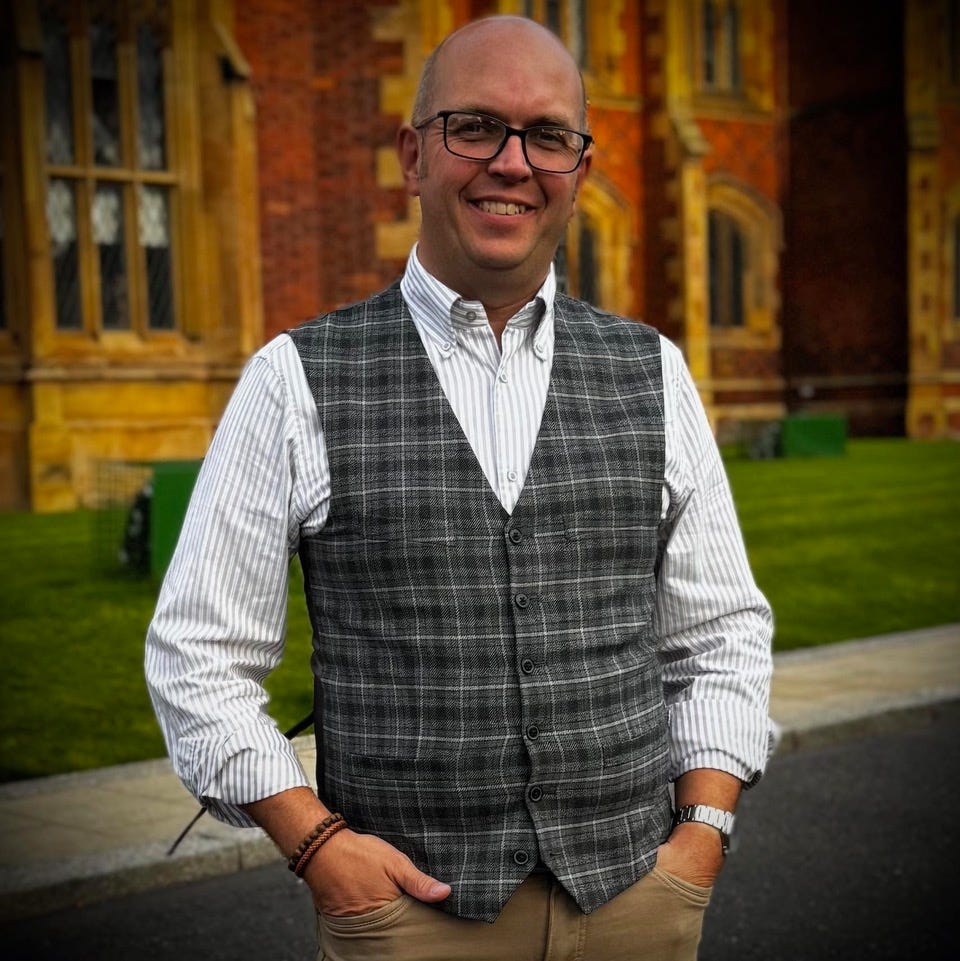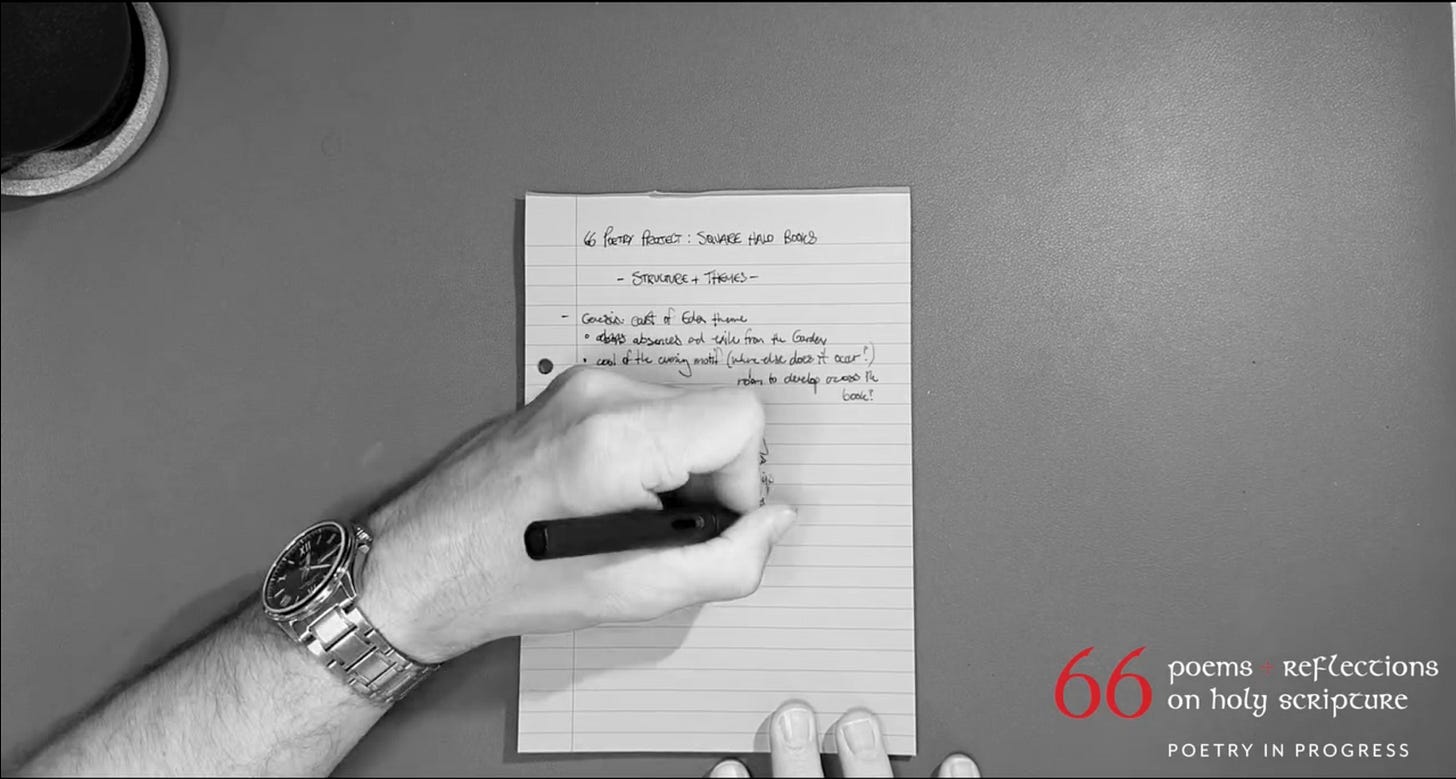I’ve enjoyed getting to know Andrew Roycroft on various social media channels, especially at his Substack newsletter
(the fact that it is called “New Grub Street” delights me for reasons that will become clear as we enter our study of eighteenth century literature in coming weeks). Andrew has undergone a dramatic shift in calling in recent days, as have I, and we have bonded a bit over that. I’m grateful he is sharing some about that and so much more in the interview below.
Tell us a bit about yourself in a few sentences.
I am 47 years old, born and living in Northern Ireland, and I have been married to Carolyn for 22 years. We have two teenage daughters. I am a poet and a freelance writer/editor.
How do you think about calling (or vocation) generally?
When we went to live in South America a number of years ago, a friend gave us sound advice about driving. He told us that coming from Ireland, we would tend to view roads like railway lines, with each move requiring a change of track. In Perú he counselled us to think of a road like a river that you join and whose flow you become part of until you exit. This saved us from a lot of collisions, but it also captures how my thinking has changed on calling.
For me, calling is part of an existing flow of human life and divine purpose; it maintains its own identity even while it navigates unexpected currents and bends in the river and can lead to some surprising journeys. Eugene Peterson said that our task in life is to discern what God is already doing and to seek to get in on it, and I think calling fits in with this profile. There is a story already unfolding in the world. God has made us who we are; he determines where and when we are born and calls us to actively live for him in the fullness of who he has made us to be, and what he has given us to do.
How do you think about calling in your own life?
My thinking on calling has changed a lot over the years. The specific breed of evangelicalism that I was raised in did talk about calling and about working out God’s will for your life. This environment tended to privilege specific callings such as pastor and missionary, and with the latter, it often challenged young people to consider if they were ‘called’ to Christian service. Over the past fifteen years or so, I have come to a different understanding of calling. God has made me who I am with my strengths and weaknesses, aptitudes and blind spots, and his call is for me to live according to my temperament and gifting, allowing him to open doors to use and express what he has already given.
I’ve also come to believe that some desires lead to callings, without me fully understanding the blessing of what that entails in advance. My love for my wife led me to marry her, but with this comes the calling of being a husband, with the joy this brings to my life and the beneficial changes that this brings to who I am. Similarly with parenting, the desire to have children has led me into callings that I didn’t know I would fulfill in advance. W. B. Yeats once wrote an epigraph to a play which stated, “in dreams begin responsibilities.” I think that’s true, but I also think that dreams bring callings that draw out of us who God has made us to be and move us to draw on his strength to fulfill them.
What are some primary callings you’ve followed over the course of your life?
I inherited callings that simply attended my arrival into the world – son and brother. Over the years, other callings have come into my life: to be husband and a father, to be a citizen and an employee, etc. Other conscious callings for me are my understanding from a very young age that God has wired me to love reading and writing. Another major calling in my life was the fulfillment of a pastoral vocation in local church ministry for twenty-four years. Carolyn and I also felt called to overseas service at a period of our lives.
Have any of those callings changed, ended, or otherwise shifted?
There have been quite a number of endings and changes over the years, some of them simple and many of them painful. I don’t think that the foundational calling that drove some of our life events has changed at all, but the expression of (and forum for) that calling has moved and shifted many times. Perhaps the most obvious and painful change was the conclusion of pastoral ministry in the past year.
In November 2024 my pastoral colleague and I simultaneously resigned our charges from a local church we were serving in. At the time, we made it very clear that this was not owing to a lapse in creed, conduct or character on our part, but represented a very vexed and protractedly sad set of circumstances. This was a shock and a shift for me, and given the pain and hurt locked into that process, I was aware that this marked the end of pastoral ministry as I had known it for my whole working life.
I quickly came to understand, though, that my calling remained intact. I had always read, always written, and always loved the work of teaching and caring for others. Those aptitudes found expression in local church ministry, but they were not dependent on that context for their fulfillment. I don’t think I could have understood this until pastoral life ended.
I have written poetry for as long as I can remember, I have written essays and articles since adolescence, and my impulse to teach has found expression in university lecturing that sat comfortably alongside pastoral work for most of my ministry life. My present season of life is seeing that vocation now blossom into full-time writing and editorial work. The crossover from my previous working experiences has surprised me.
A good editor will pastor and disciple authors under their care and seek to nurture the vocational gifting of those whose work they aid in getting into the world. The writing I enjoy most as a reader is not magisterial but ministerial, keeping the reader in view at all times. These were elements that mainly resided in the sermon and the pastoral visit for me in my former work, but that are alive and well and enjoying their new neighbourhood in my freelancing work now. I am in awe of how God gives a calling, how he nurtures and develops it through what are often bewildering experiences, and how he can trace a single thread through a multitude of happenings that look disconnected to the human eye.
What roles have other people played in helping you discern and follow a calling?
Top of the list is my wife, Carolyn. She has partnered with me in life since we were both teenagers, has walked with me through university years, stood with me through church ministry years, and has lovingly helped me to discern and pursue the things that God has given me to do in life. Her wisdom, her eye for the details of God’s providence unfolding around us as a couple, and her willingness to step forward in faith to see God’s call on our lives fulfilled have been frankly amazing. She is wiser and braver about these things than I am, by a country mile! Linked with this is the encouragement and spirit of adventure that our teenage daughters embody. Being alongside us in our calling is hopefully helping them to discern their own, but they have also been incredible traveling companions through what God has given us to do, and where God has asked us to go. For them and for Carolyn, there has been real pain wrapped up in this, and that can be hard for me to come to terms with at times.
Lecturers at Queens University Belfast were incredibly kind to me as an English undergraduate and postgraduate. Many of them didn’t share my faith in God, but they did have faith in me and encouraged me to develop and to be more daring.
There is a host of other people I could mention, but the artist Ross Wilson has had a very powerful influence on my thinking and my direction in life. Ross is a highly respected painter and sculptor with an incredible body of work behind him, and yet he has come alongside me at key moments and encouraged me to pursue poetry, writing, and the arts. His view of God’s grace at work in everything we do, and each creative impulse we follow, has liberated my own thinking from the early Fundamentalist suspicions and limitations that were part of my church upbringing. More than anyone else, Ross has encouraged me to see common grace as the space where God’s work can be witnessed, and to recognise that ‘Christ plays in ten thousand places’. Ross’s desire to join that chorus through his artistic calling and his gracious counsel that my writing should do the same has been life-changing for me.
Artistically, Ned Bustard has humbly and graciously urged me to keep my vocation front and center in heart and mind. In the middle of a very tough pastorate, Ned (along with his much-missed late wife Leslie) was instrumental in helping me to locate green pastures in the publication of our collaborative collection, 33, with Square Halo Books. We are working together again on a new collection of poems and linocuts entitled 66, which will contain a long poetic reflection on every book of the Bible, accompanied by Ned’s wonderful art and some introductory and liturgical material. Ned helps me to see the benefit of hard graft at one’s craft and the responsibility to steward gifting in a way that isn’t afraid to bring it into the light and to people’s hearts.

Being part of Cultivating and the fellowship of writers who are part of that publication is also proving formative for me. The engagement with one another’s work, the development and honing of craft, and the pastoral concern and care that Lancia Smith invests in this group is helping me to better understand the community element of pursuing calling.
I must be honest and say that your example has also been a help to me in discerning my calling. Watching you journey through fluctuation and painful changes of circumstance, while retaining the core calling God has placed on your life, has been exemplary to me. I’m benefitting a lot from reading your You Have a Calling, but observing how you have walked with courage, empathy and grace through major challenges has been a ministry to my soul. The issues I have faced in the painful change of expression in my vocation bear some resemblance to those you faced, although mine were on a much lower and lesser scale. Observing you fill your vocational space left by your teaching career with a ministry that reaches equally widely and deeply has given me no small courage to believe that transitions of circumstance don’t demand the relinquishing of calling.
There are also many other people who have recognised my calling to write and who have given their support to me. These are people who have come on board with the idea that writing is my vocation and who have offered encouragement, critique and opportunities to share my work that I wouldn’t have dared to ask for. Among these is a group of individuals who have supported me on Substack in these earliest days of following my vocation as a writer. They may be small in number, but their belief in what I am doing and their willingness to help me live off writing have been humbling.
I know that it’s a privilege to receive this kind of encouragement in discerning my calling, and it’s likewise a joy to continue to help others think through who they are and the ways in which God can use their unique gifting, interests and personalities to serve him and their neighbours.
***
A note of thanks to award-winning Common Good magazine for sponsoring the last installments of this series of interviews on calling. Common Good offers some of the best writing and analysis out there on art, culture, theology, and—you guessed it—vocation. They are “a magazine for all of life” and honestly, that really does capture the spirit of the publication. Common Good is making a special offer to readers of The Priory (and you won’t believe this): a year’s subscription to the magazine for ONE DOLLAR. Yes, you read that correctly. One buck. Just use this code: KSPCG
Next week, I will offer some hard reflections that have been brewing as I have approached my third year of not going back to school.
September 2 we go back to class!!! We will pick up our reading with the English Neoclassical poet Alexander Pope. We’ll start with An Essay on Man and see what your pleasure is from there, readers. I’m curious if you are familiar with Pope already, and if so if you enjoy him or not. If you don’t know him, I can’t wait to see what you think! Oscar Wilde was not a fan. He famously quipped, “There are two ways of disliking poetry; one way is to dislike it, the other is to read Pope.”
For the old-school readers among us who like to use print books, I’d suggest either this very inexpensive Dover Thrift edition of Pope or this nicer, more complete Oxford World’s Classics edition. All the works we will cover are online, too. I just find it hard to read poetry (or any literature) that way. There are a few works I’d like to cover, but I will wait to hear from you, my readers, to learn if you are Team Pope or Team Wilde!
I’m pleased to share the review of You Have a Calling from Englewood Review of Books! Nothing is better than a positive review with a few sharpening points. (Thank you,
!)Finally, a note of thanks to all of my subscribers, especially those of you who choose to support this work with a paid subscription. I do not take such support for granted, given how limited time and resources are. As I wrote in You Have a Calling, gig work is new to me, an economic reality I never thought would be my reality after decades of regular employment. Hustle culture is hard, but all of you who read along, share, and offer financial support give me encouragement and hope. THANK YOU.
"Absolutely unmixed attention is prayer.” – Simone Weil1
Simone Weil, Gravity and Grace, trans. By Emma Crawford and Mario von der Ruhr (London: Routledge, 2002), 117.






"Those aptitudes found expression in local church ministry, but they were not dependent on that context for their fulfillment. I don’t think I could have understood this until pastoral life ended" - Andrew, as someone who is planning to semi (or fully) retire from pastoral ministry next summer, and who sat down after preaching his little heart out this past Sunday morning, overcome by the feeling 'I'll never do something so significant again', those words were like gold, thank you so much for framing it that way. (I quickly reminded myself of the counsel I'd give to others, that in God's good and gracious hands all things are significant, even a cup of cold water - but I'm sure you recognise the weakness of the post-preaching moment...). Also, as a fellow leftie who enjoys writing on paper with pen and ink (including some Diamine Earl Grey) it's great to see those photos!
Awesome interview!